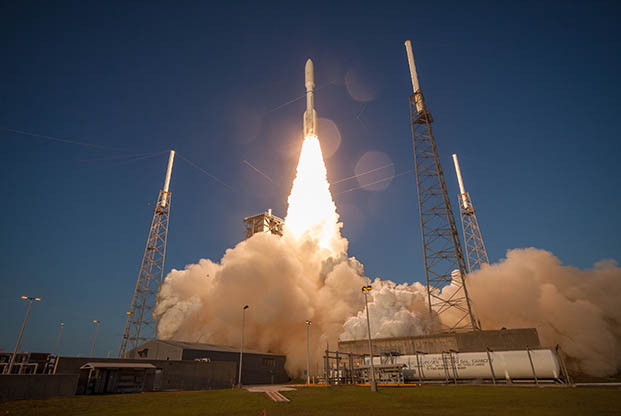
The USAF contracts awarded to Blue Origin, Northrop Grumman, and United Launch Alliance aim to end reliance on the Russian-made RD-180 rocket engine that powers both the Delta IV and the Atlas V, shown here during an April 14 launch from Cape Canaveral Air Force Station, Florida. ULA photo.
The Air Force on Wednesday awarded three contracts for Evolved Expendable Launch Vehicle services to Blue Origin, Northrop Grumman, and United Launch Alliance, notably leaving out SpaceX as the service begins development of its next-generation launch providers.
The Air Force awarded an initial obligation of $181 million, with $500 million in total government funding for Blue Origin to develop its “New Glenn” launch system. The system includes a fully reusable first stage, BE-4 booster engine, and a BE-3U upper stage engine, with a planned initial launch capability of 2020.
Northrop Grumman received an initial obligation of $181 million, with $792 million in total government funding for development of the OmegA launch system, which includes a solid rocket motor first and second stage, with an RL10 upper stage engine. This system has a planned initial launch capability of 2021.
United Launch Alliance, the historic launch provider for the Air Force, will receive an initial obligation of $181 million and $967 million in total government funding for the development of the Vulcan Centaur launch system. This includes BE-4 booster engines, a next generation RL10 upper stage engine, and GEM 63XL solid rocket motors. This system has a planned initial launch capability of 2021.
The differences in total government funding are from the proposals from the companies, not a decision on the Air Force’s side of the agreements, said Will Roper, the Air Force’s head of acquisition.
The contracts are the first of two phases of the Air Force’s EELV launch service process. The Air Force plans a second phase, a competitive selection of two providers, no earlier than Fiscal 2020, with a request for proposals expected next year. While the first phase focused on Blue Origin, Northrop, and ULA, the second phase is open to other possible providers, meaning SpaceX can re-enter, Roper said. While SpaceX is not a part of this initial process, it is still on contract for seven more launches, Roper said.
The EELV schedule follows a Congressionally mandated deadline of 2022 to end reliance on the Russian-made RD-180 rocket engine that powers the Atlas V. The Air Force has ULA on contract to provide launches using this system through 2023 as the next-generation launch service provider process continues. While the systems are still early in development, the Air Force is confident “each company has a viable path” to provide a reliable system, Roper said.
